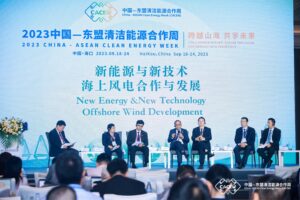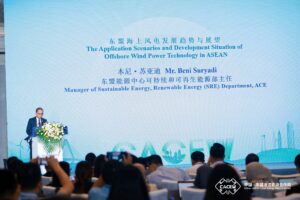Menu

The East Asia Summit Clean Energy Forum (EAS CEF) has served as a platform for energy cooperation in the East Asia region since its inception in 2014. The 6th EAS CEF was held concurrently as a part of the China-ASEAN Clean Energy Week from 19-20 September 2023 in Haikou, Hainan Province, China. The summit was brought under the compelling theme of “For a Shared Future: Across the Ocean and Abreast into Prosperity”, emphasising offshore wind development. The summit consisted of five subforums, which respectively focused on sustainable hydropower development, offshore wind development, green investment, as well as power trade and consumption.
The EAS CEF was opened with keynote speeches delivered by many distinguished speakers from related China and ASEAN agencies. The speakers shared the status quo and experiences in clean energy development and transition from the ASEAN region to China. Dr. Li Sheng, the Director General of China Renewable Energy Engineering Institute (CREEI), asserted the importance of strong national will, science-based planning, extensive market participation, policy certainty, and technological innovation and demonstration— in the success of China’s energy transition. Mr. Iman Faskayana, the Alternate Secretary-In-Charge of Heads of ASEAN Power Utilities/Authorities (HAPUA), highlighted the roles of ASEAN Grid Interconnection in ramping up clean energy development in the region. Furthermore, Mr. Iman Faskayanana underlined the ASEAN Regional Interconnection Feasibility Study undertaking in realising the interconnection potentials.
The Sub Forum I: Provinces Dialogue session was carried out in the setting of a panel discussion which involved speakers from provincial governments in China and Bali of Indonesia, along with H.E. Arifin Tasrif, the Minister of Energy and Mineral Resources, Indonesia, as well as Mr. Iman Faskayana of HAPUA. The theme of the guiding questions encompassed compelling and relevant issues, such as clean energy cooperation between regions under the existing framework of the Regional Comprehensive Economic Partnership (RCEP). The Sub Forum I: Provinces Dialogue also addressed the challenges and opportunities of leveraging clean energy development at the provincial level and how cooperation among provincial governments across the two regions can be galvanised.
The agenda was followed by the Report Launch session of two reports jointly produced by China Renewable Energy Engineering (CREEI) and ASEAN Centre for Energy (ACE), titled ASEAN Offshore Wind Development Roadmap as well as Ramping Up Renewable Energy under Low-Carbon Transition Pathways of ASEAN. Mr. Zhang Yiguo, Chief Planning Engineer of China Renewable Energy Engineering Institute (CREEI), delivered an introductory presentation to the ASEAN Offshore Wind Development Roadmap. He highlighted the role of RCEP in facilitating further cooperation between the two regions in offshore wind technologies development.
In her presentation for the Ramping Up Renewable Energy under Low-Carbon Transition Pathways of ASEAN, Ms. Zhang Muzi, Director of the General Affairs Division, International Cooperation Department, China Renewable Energy Engineering Institute (CREEI)— recommended more vigorous RE technology exchanges, cooperation, and investment among ASEAN+3 countries to increase RE capacity in the region. The session also incorporated the China Green Electricity Certificate Development Report 2022 presentation by China National Renewable Energy Information Management Center and ASEAN’s Plan of Action for Energy Cooperation (APAEC) and Cooperation Opportunities by the ASEAN Centre for Energy.
Sub Forum II on Sustainable Hydropower Development and Sub Forum III on Offshore Wind Development were conducted in parallel on September 20, 2023. These two sessions were held in the setting of a keynote presentation and were immediately followed by a panel discussion. Subforum II had representatives of ASEAN presenting about the current context of hydropower in their respective nations. In his presentation, Mr. Souliya Sengdalavong, the Deputy Director, Department of Energy Policy and Planning, Ministry of Energy and Mineral Resources, Lao PDR, shared the Laotian experience regarding sustainable measures for hydropower development.

Dr. Anoulak Kittikhoun, the CEO of the Mekong River Commission (MRC) Secretariat, asserted the importance of data sharing between the MCR and ASEAN Member Countries to ensure more comprehensive disaster resilience measures. On Subforum III, Mr. Beni Suryadi, Manager of Sustainable Energy, Renewable Energy (SRE) Department of ACE, shared insights on how offshore wind development can play a pivotal role in driving RE integration in the region. In his presentation, Mr. Yi Yuechun, Executive Director General of CREEI, highlighted the importance of establishing an emergency management system for offshore wind project construction to ensure the safety of the process.
Sub Forum IV, which focused on Green Investment, were enriched with the experience sharing of clean energy investment in Malaysia, presented by Mr. Saiful Hakim bin Abdul Rahman, Director of the Strategic Planning Department, Sustainable Energy Development Authority (SEDA) , Malaysia. He pointed to the role of the carbon pricing mechanism in facilitating additional capital pools for investments in energy transition. Mr. Tran Dong Phuong, Senior Policy Advisor of the Economic Research Institute for ASEAN and East Asia (ERIA), in his analysis of transition technology financing in ASEAN, emphasised the accessibility and affordability of energy supply as the most fundamental requirement for energy transition in ASEAN.
Sub Forum V, with the topic of Power Trade & Consumption, saw the experience sharing from ASEAN Member States and China. H.E. Thongphat Inthavong, Vice Minister of Energy and Mines of Lao PDR, in his keynote presentation about power interconnection of Lao PDR highlighted the need to prioritise power infrastructure development to leverage power interconnection in the region. The keynote presentation of this Sub Forum by Mr. Warsono, Executive Vice President of Electricity System Planning, Perusahaan Listrik Negara (PLN) of Indonesia, revealed the importance of building Green Enabling Super Grid to solve the issue of supply mismatch and further integrating the national power system.
